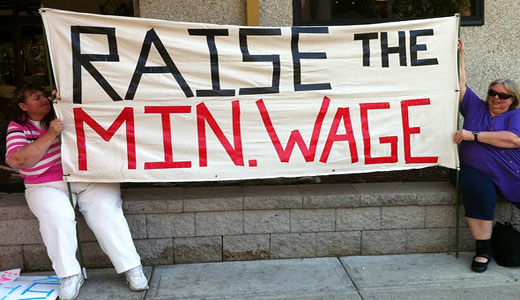
WASHINGTON – Raising the federal minimum wage from its present $7.25 hourly to $9.80 over the next two years would create 100,000 new jobs, and at no cost to the federal government, the Economic Policy Institute calculates.
The EPI study, by Doug Hall and David Cooper, flies in the face of business and right-wing assertions that a minimum wage hike would – and always has – cost jobs.
But the two explain that the proposed increase, in three 85-cents-per-hour increments over the next two years, would generate an additional $25 billion in economic activity, virtually all of it in consumer purchasing power. That would increase demand for goods and services and, to meet that demand, businesses would have to create jobs, the two said. It would also help 28 million workers, directly and indirectly.
Cooper and Hall studied the impact of minimum wage hike bills by Senate Labor Committee Chairman Tom Harkin, D-Iowa, and Rep. George Miller, D-Calif., the top Democrat on the Republican-run House Education and the Workforce Committee. Given successful Republican filibustering in the Senate and the ideologically rigid anti-worker GOP majority running the House, both are dead in 2012. But Miller and Harkin want to lay the groundwork for future debates on raising the minimum wage.
“Using the same standard fiscal multipliers to analyze the jobs impact of an increase in compensation of low-wage workers and decrease in corporate profits that result from a minimum-wage increase, we find that increasing the national minimum wage from $7.25 to $9.80 per hour by July 1, 2014, would result in a net increase in economic activity of approximately $25 billion over the phase-in period, and over that period would generate approximately 100,000 new jobs,” the EPI study says.
Jobs would be created in each state. Almost nine of every ten workers who would benefit would be over the age of 20 – not teenagers, again countering a right-wing argument – and 54.5 percent would be woman workers, the study found.
“Though the resulting employment impact is modest in the context of the millions of workers currently unemployed nationwide, creating tens of thousands of jobs would be a step in the right direction and would boost the economy.”
As with past minimum-wage hikes, the increase would benefit more than just the lowest-paid workers. “Like unemployment insurance benefits or tax breaks for low- and middle-income workers, raising the minimum wage puts more money in the pockets of working families when they need it most, thereby augmenting their spending power.
Economists generally recognize that low-wage workers are more likely than any other income group to spend any extra earnings immediately on previously unaffordable basic needs or services,” EPI’s study says. The study is on EPI’s website.
Photo: Wisconsin Jobs Now/Flickr












Comments